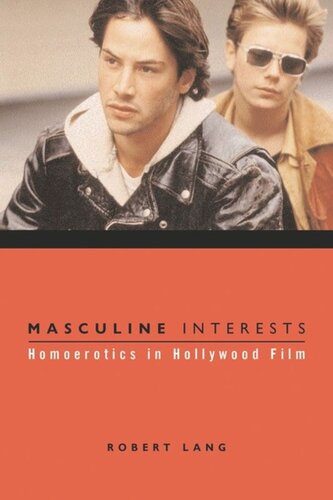

Most ebook files are in PDF format, so you can easily read them using various software such as Foxit Reader or directly on the Google Chrome browser.
Some ebook files are released by publishers in other formats such as .awz, .mobi, .epub, .fb2, etc. You may need to install specific software to read these formats on mobile/PC, such as Calibre.
Please read the tutorial at this link: https://ebookbell.com/faq
We offer FREE conversion to the popular formats you request; however, this may take some time. Therefore, right after payment, please email us, and we will try to provide the service as quickly as possible.
For some exceptional file formats or broken links (if any), please refrain from opening any disputes. Instead, email us first, and we will try to assist within a maximum of 6 hours.
EbookBell Team

5.0
70 reviewsUntil Masculine Interests not much had been written about men "as men" in the cinema. Using nine Hollywood genre films from 1932 to the late 1990s, Lang shows how Hollywood's chief function to define, codify, valorize and critique varieties of masculinity reveals contradictions with its surface norms of heterosexual masculinity, particularly in those films that cover the troubled terrain of male-male relationships. Despite Hollywood's normative narrative conventions, these films involve a spectrum of primary bonds among men, sexual and nonsexual, conscious and unconscious. Lang questions the way our culture distinguishes between homosexuality and non-homosexual forms of male bonding, and argues for a more complex notion of a homosocial continuum.
Until Masculine Interests not much had been written about men "as men" in the cinema. Now Robert Lang considers how Hollywood articulates the eroticism that is intrinsic to identification between men. He considers masculinity in social and psychoanalytic terms, maintaining that a major function of the movies is to define different types of masculinity, and to either valorize or criticize these forms. Focusing on several films—primarily The Lion King, The Most Dangerous Game, The Outlaw, Kiss Me Deadly, Midnight Cowboy, Innerspace, My Own Private Idaho, the Batman series, and Jerry Maguire—Lang questions the way in which American culture distinguishes between homosexual and nonhomosexual forms of male bonding. In arguing for a much more complex recognition of the homosocial continuum, he contends that queer sexuality is far more present in American cinema than is usually acknowledged.